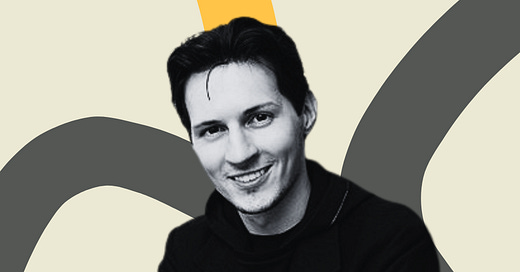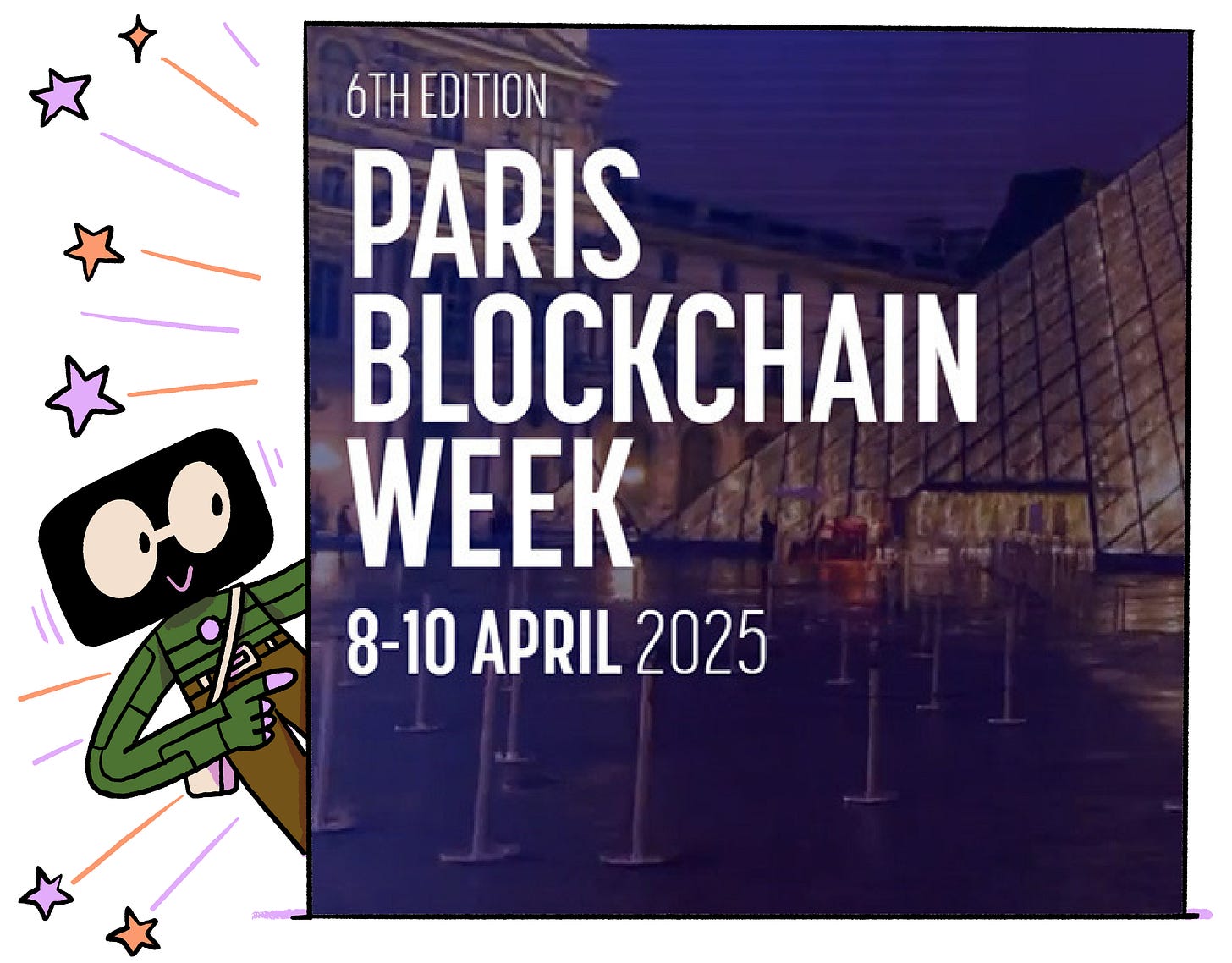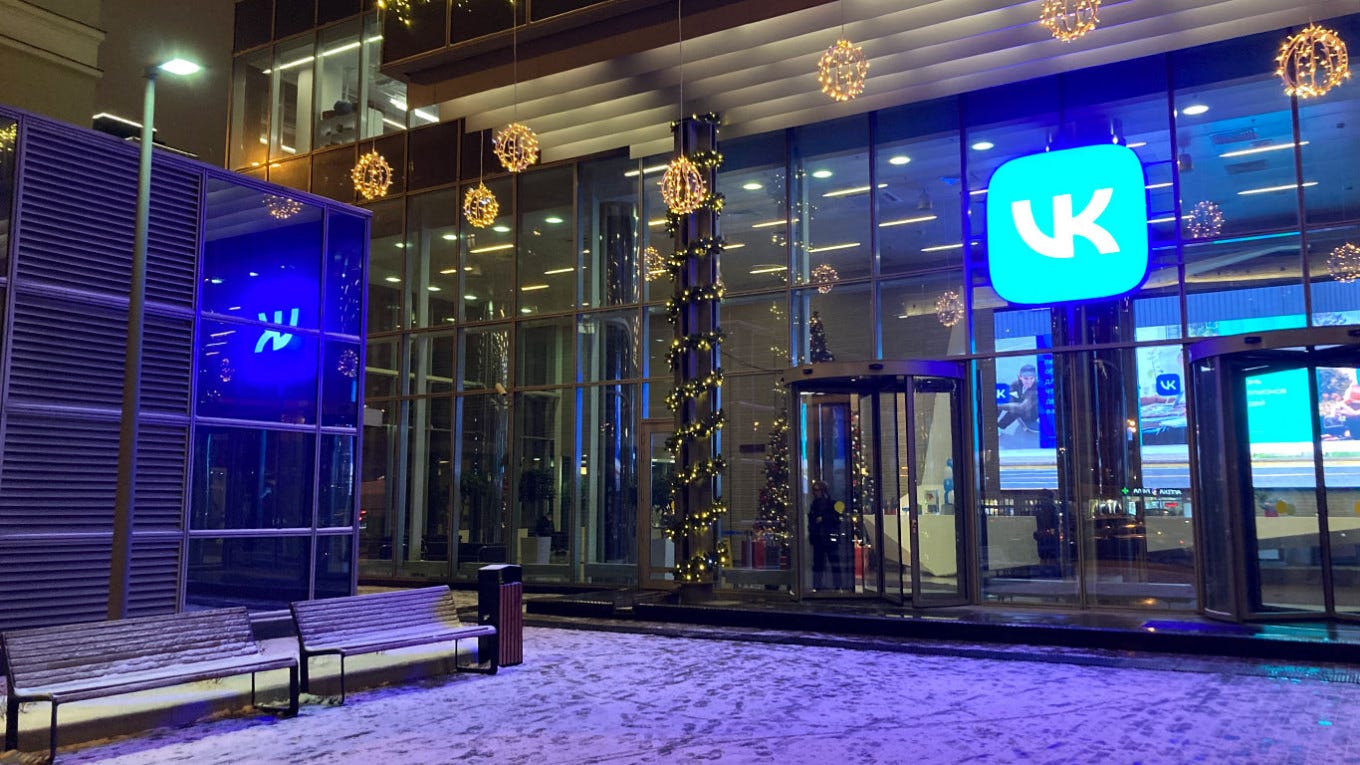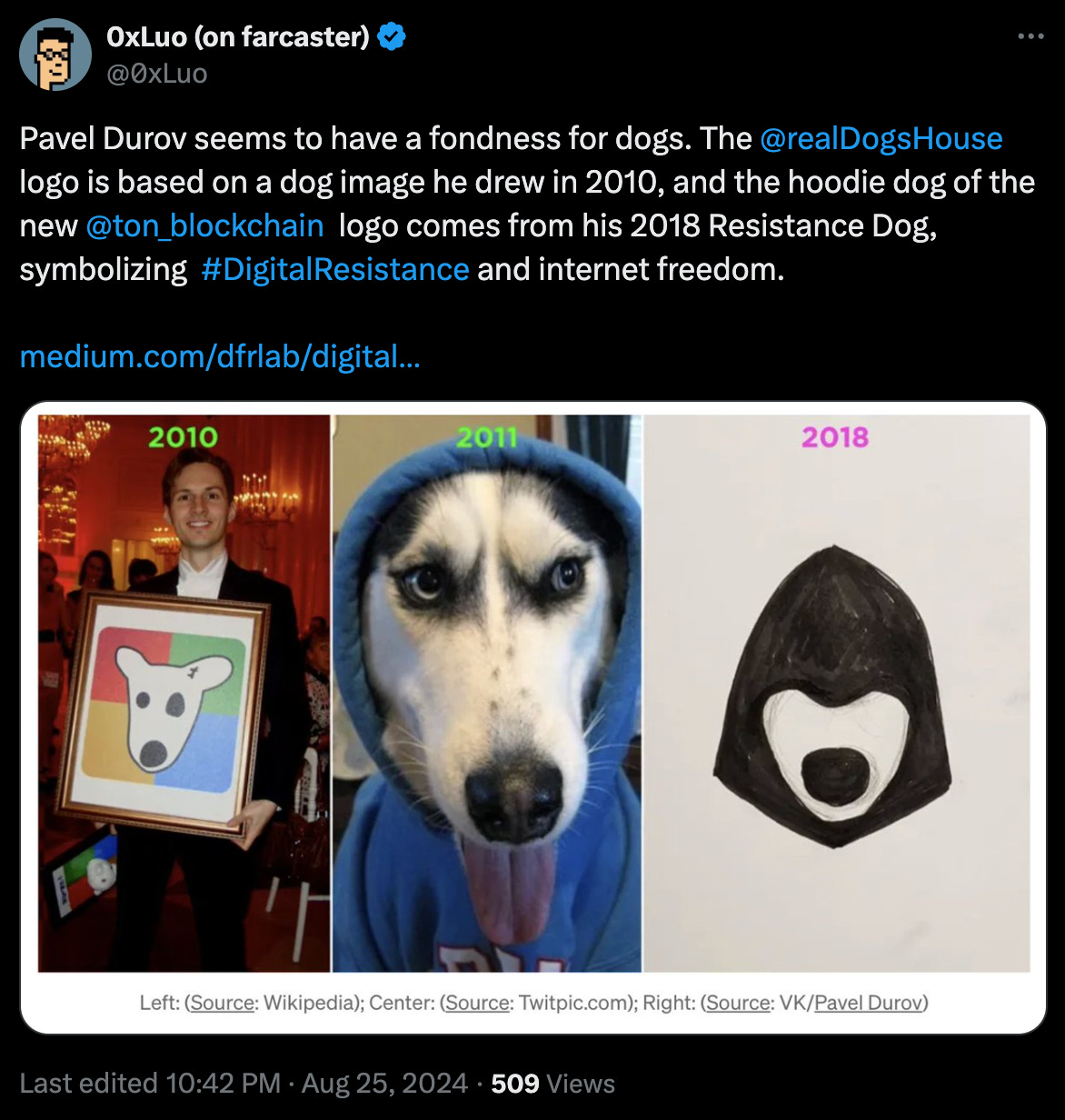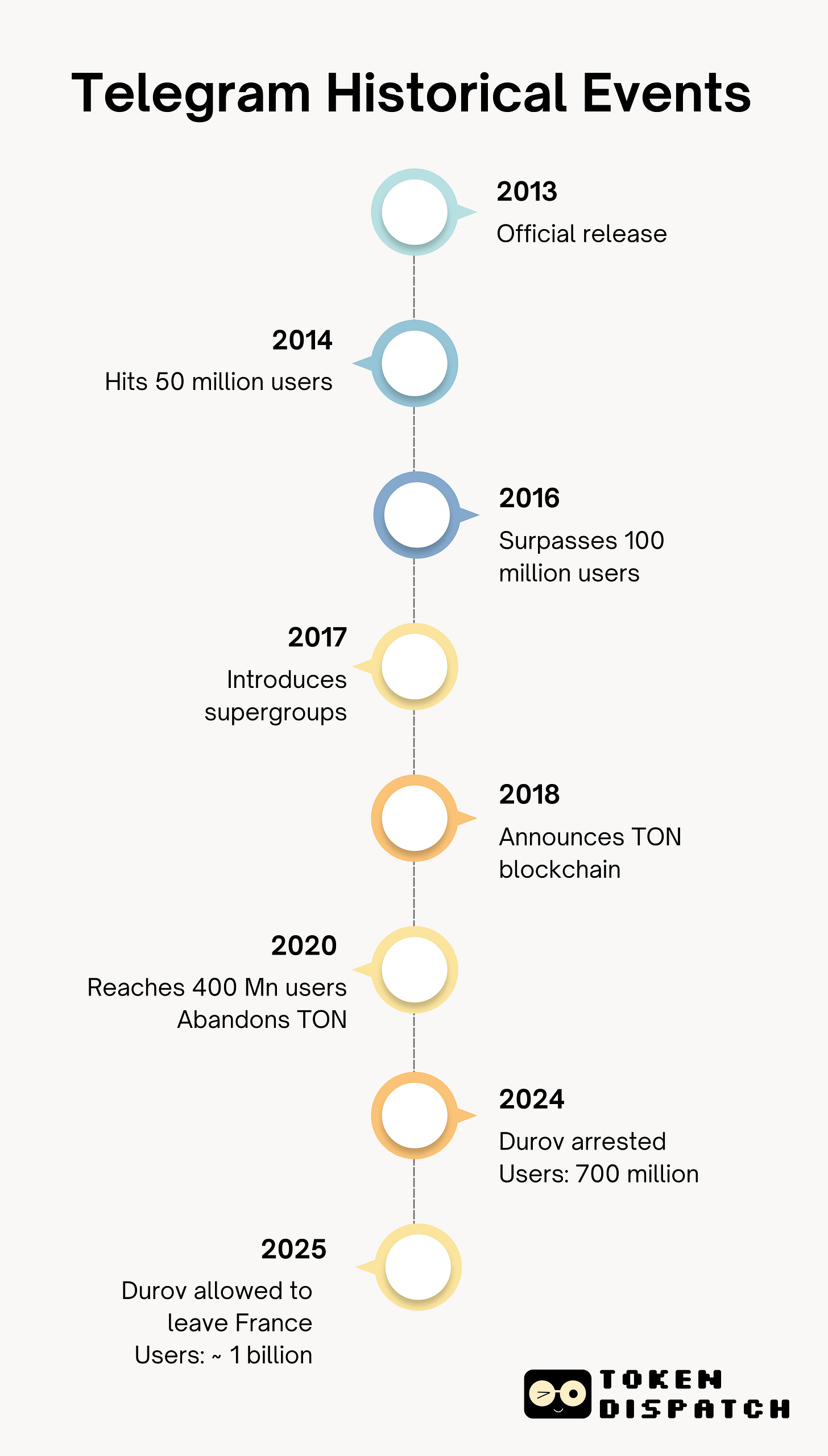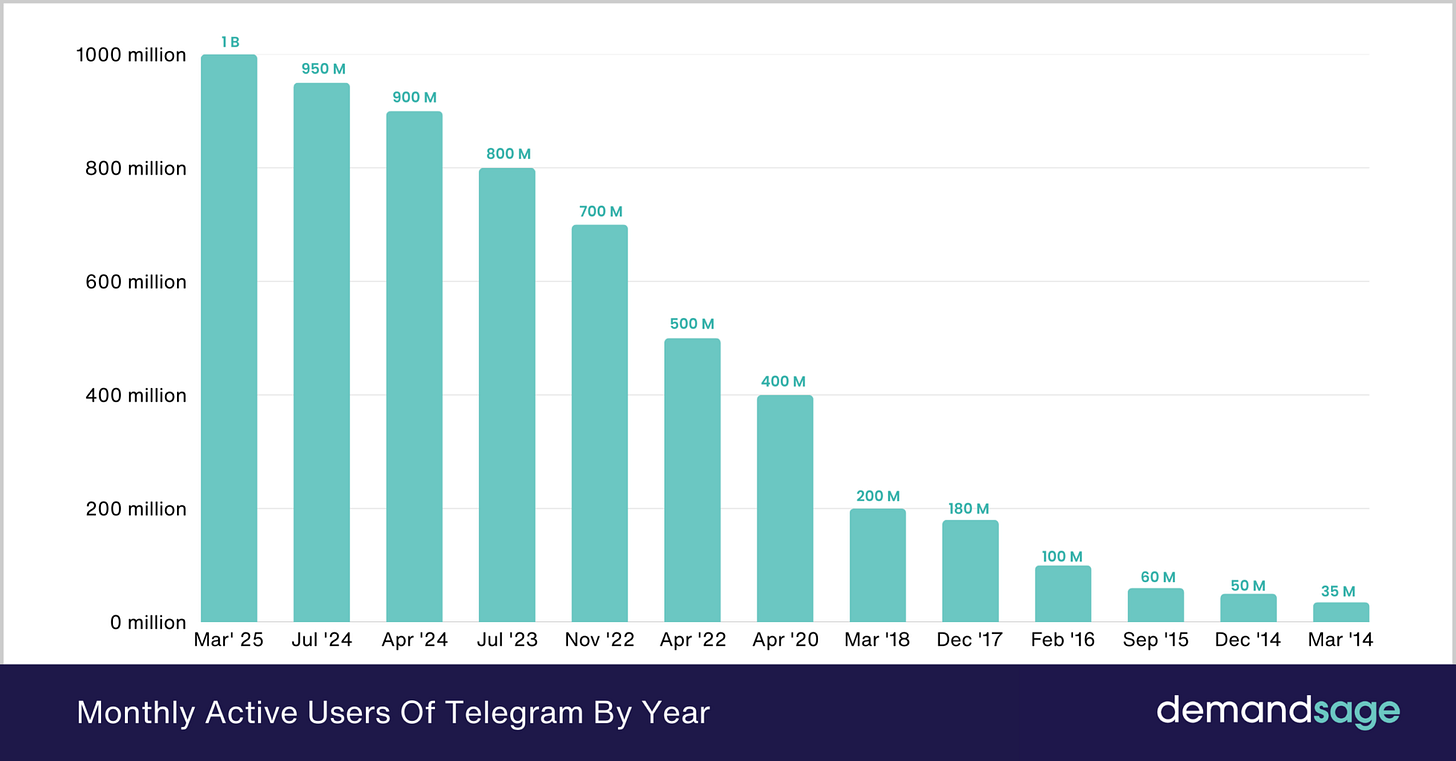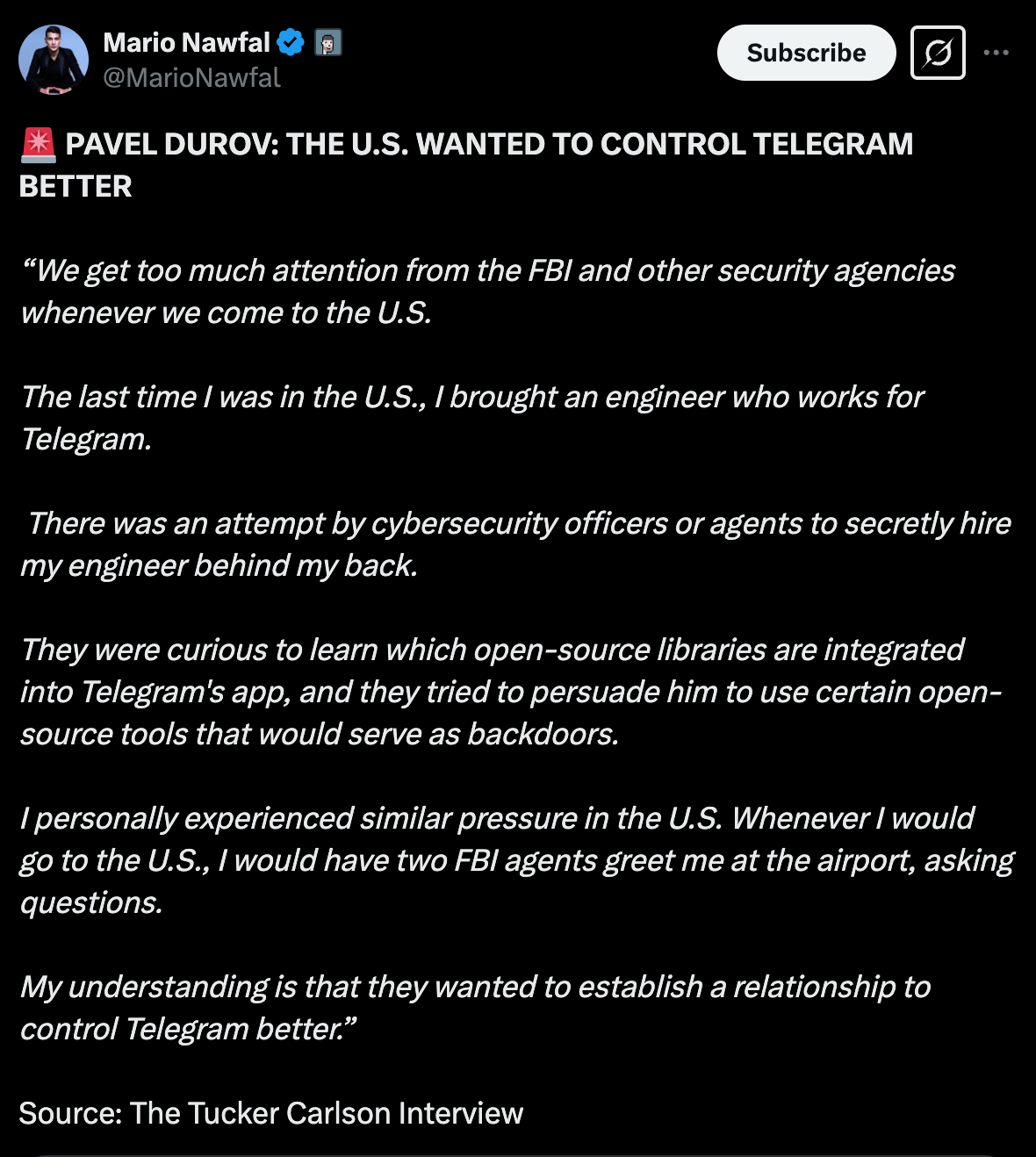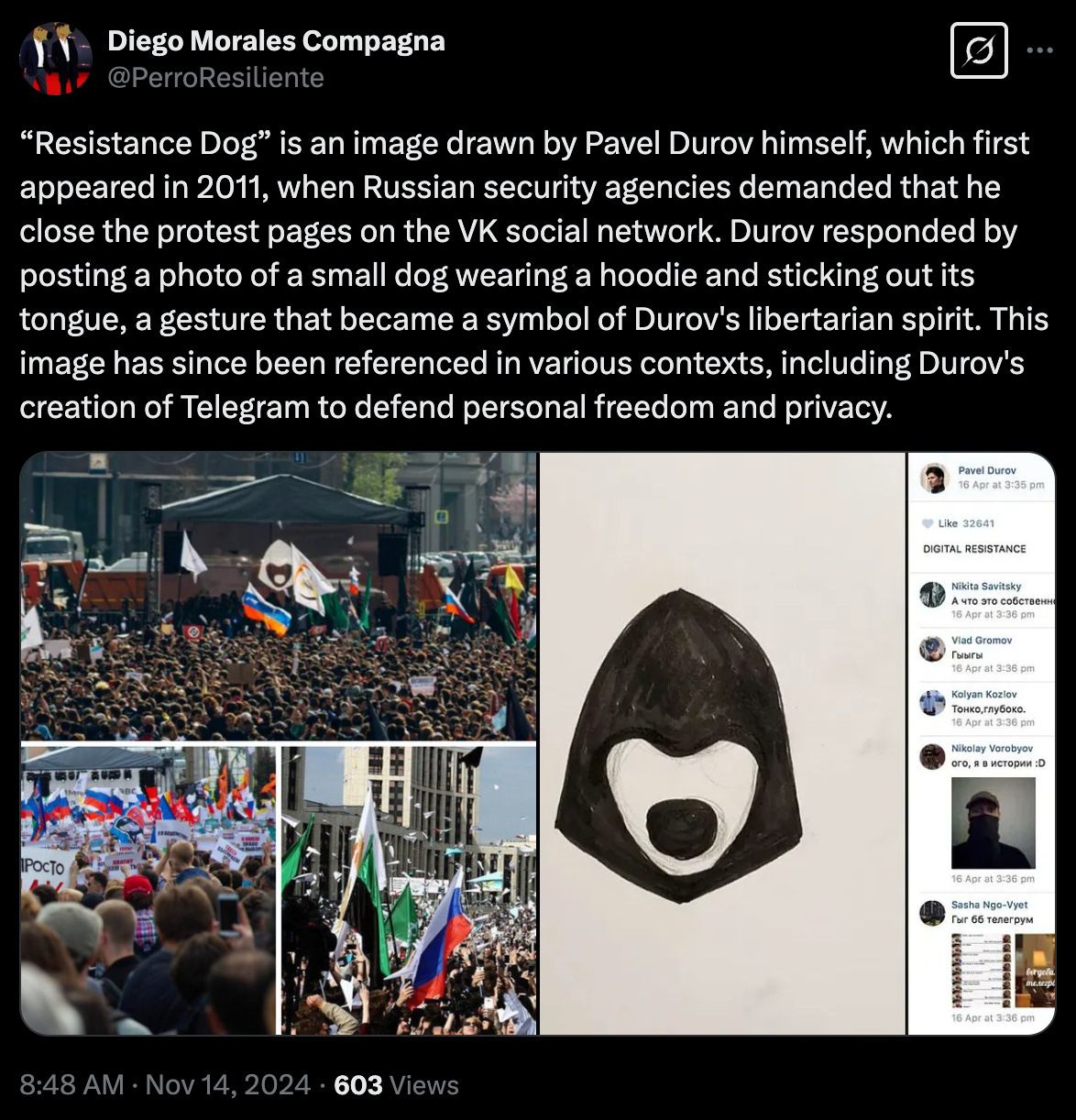TGIF Dispatchers.
From a college dorm in St. Petersburg to the crosshairs of global law enforcement.
From building Russia's Facebook to creating the messaging platform that secures communications for nearly a billion people worldwide.
From tech wonderkind to billionaire exile dodging governments that want access to his users' private conversations.
Pavel Durov's journey has had many twists and turns in the tech world.
When French authorities arrested the Telegram founder at Paris's Le Bourget airport last August, it was the latest chapter in a decade-long battle between one man's vision of digital freedom and governments desperate to peek behind encryption's curtain.
Now, as Durov returns to Dubai after seven months of legal limbo in France, the questions only grow more urgent: Can true privacy exist in our digital world? And at what cost?
Let's dive into the remarkable story of the man they once called "Russia's Zuckerberg".
Paris Blockchain Week 2025 – The Future of Web3 Awaits!
Join industry leaders, innovators, and investors at one of the most anticipated blockchain events of the year! From April 8-12, experience groundbreaking discussions, exclusive networking, and cutting-edge insights in the heart of Paris.
10,000+ attendees | 400+ speakers | 100+ sessions
Explore DeFi, NFTs, AI, and Web3 innovations with top global experts!
Secure your spot today and be part of the future. Limited seats available!
A Prodigy in Leningrad
Pavel Durov was born on October 10, 1984, in Leningrad (now St. Petersburg), Soviet Union. From his earliest years, a pattern emerged that would define his life: exceptional intellect paired with an independent streak.
While his father Valery, a respected philologist, immersed himself in language and literature, young Pavel gravitated toward computers and programming.
Durov's academic journey took him first to Italy, where his father held a teaching position, then back to Russia's prestigious Academic Gymnasium in St. Petersburg.
There, his aptitude for technology began to crystallise.
The list of his youthful accomplishments reads like a prodigy's resume.
Gold medals at the International Olympiad in Informatics
Bronze medal at the International Mathematical Olympiad
Recognition as "Absolute World Champion in Programming" (2000-2001)
Get 17% discount on our annual plans and access our weekly premium features (HashedIn, Wormhole, Rabbit hole and Mempool) and subscribers only posts. Also, show us some love on Twitter and Telegram.
Facebook's Russian Twin?
When time was ripe for university, Durov made a surprising choice. Rather than pursuing computer science, he enrolled at Saint Petersburg State University to study philology – following his father while continuing to develop his programming skills, independently.
While still at university, Durov, like many young programmers of his generation, found inspiration in the rise of Facebook in the West. The inspiration didn’t mean merely admiring Mark Zuckerberg's creation from afar. Instead, he decided to build a new version for the Russian-speaking world.
In 2006, the same year he graduated, Durov leveraged his coding skills and the mathematical brilliance of his older brother Nikolai to launch VKontakte (VK) – a social network specifically designed for Russian speakers. The platform quickly gained traction, filling a vacuum in the Russian market where no comparable service existed.
Collision Course with the Kremlin
Durov's vision for VK was clear: keep it free, user-friendly, and ensure free expression. Under his leadership, the platform expanded rapidly, becoming the largest social network in Russia and the surrounding region within just a few years.
As VK grew, it attracted attention from both competitors and the Russian government, which increasingly sought to exert control over online discourse. The platform became a hub for organising anti-government protests in 2011-2012, placing Durov directly in the Kremlin's crosshairs.
His response to mounting pressure became legendary. When Russian authorities demanded he shut down opposition groups on VK, Durov posted a picture of a dog in a hoodie sticking out its tongue – his defiant refusal to comply. When asked to hand over user data to the FSB (Russian security service), he again refused.
It was a principled stance, but one that would prove costly. By 2014, facing mounting pressure from the government and a hostile takeover by Kremlin-aligned shareholders, Durov was forced out of VK, the company he had built from scratch.
"I'm out of Russia and have no plans to go back," Durov wrote after selling his remaining stake and leaving the country. "Unfortunately, the country is incompatible with internet business at the moment."
The Birth of Telegram
Even as his VK chapter was coming to a turbulent close, Durov had already begun working on his next venture – one that would make him not just a successful entrepreneur, but a global symbol of digital privacy.
In 2013, while still navigating the final months at VK, Durov and his brother Nikolai launched Telegram Messenger.
This was more than just another messaging app in an already crowded market. Telegram represented Durov's direct response to the surveillance and censorship he had experienced firsthand. Using Nikolai's MTProto protocol, the app ensured that messages were encrypted, making them nearly impossible for governments or other third parties to intercept.
A Global Privacy Platform Emerges
Telegram's growth was modest at first, but its appeal quickly became apparent in a post-Snowden world increasingly concerned with privacy. Within two years, the app had surpassed 50 million monthly active users, drawn to features like "Secret Chats" with self-destructing messages, "Channels" for broadcasting to large audiences, and bots for automated services.
By 2017, Telegram was handling over 15 billion messages daily and had crossed the 100 million monthly active user mark. The app proved particularly popular in regions with strict government surveillance, including parts of Europe, the Middle East, and Asia.
Now? It’s grown to become a platform with around 1 billion user-base.
This rapid growth didn't go unnoticed. Governments around the world began to take issue with Telegram's potential to facilitate communication outside their control. In response, several nations attempted to block or restrict access to the app, citing concerns about its use by terrorists and dissidents.
Russia itself tried to ban Telegram in 2018 after Durov refused to provide encryption keys to the FSB. The ban was a technical failure – Telegram continued to function using various circumvention techniques – and was eventually lifted in 2020, an implicit acknowledgment of Durov's victory.
Citizenship and Sanctuary
Meanwhile, Durov himself had become a global citizen, obtaining citizenship in Saint Kitts and Nevis in 2014 (by making a $250,000 donation to the country's sugar industry) and eventually settling in Dubai in 2017, seeking a business-friendly environment with minimal political interference.
By 2024, Telegram had grown to nearly 950 million monthly active users, with Durov's fortune estimated at over $15 billion. The platform had also expanded beyond messaging, integrating with The Open Network (TON) blockchain and reportedly approaching profitability for the first time.
In interview with Tucker Carlson, Telegram founder Pavel Durov made startling allegations about interactions with US security agencies, claiming they sought to exert control over the popular messaging platform. Durov stated that Telegram receives "too much attention from the FBI and other security agencies" whenever he or his team visits the United States.
The French Detention
On August 24, 2024, Pavel Durov's private jet touched down at Le Bourget Airport just north of Paris. Moments later, he was in handcuffs, detained by French authorities as part of an investigation into criminal activities allegedly facilitated by Telegram.
The charges were serious: complicity in managing an online platform to enable illegal transactions, including drug trafficking, child sexual abuse material distribution, and fraud, along with refusal to cooperate with law enforcement.
After several days in custody, Durov was released on €5 million bail but prohibited from leaving France. The conditions of his judicial supervision required him to check in with police twice weekly as investigations continued.
Global Outcry and Legal Limbo
The arrest sparked international outrage, particularly in tech and crypto communities. Supporters placed paper planes – Telegram's logo – outside the French embassy in Moscow. The hashtag #FreePavel trended globally. Prominent figures from Elon Musk to Edward Snowden voiced support for Durov.
Critics argued the arrest represented an attack on encryption and free speech itself. Supporters of the French authorities countered that Telegram's minimal moderation had made it a haven for illegal activities, with prosecutors citing the platform's "near-total absence" of cooperation with law enforcement requests.
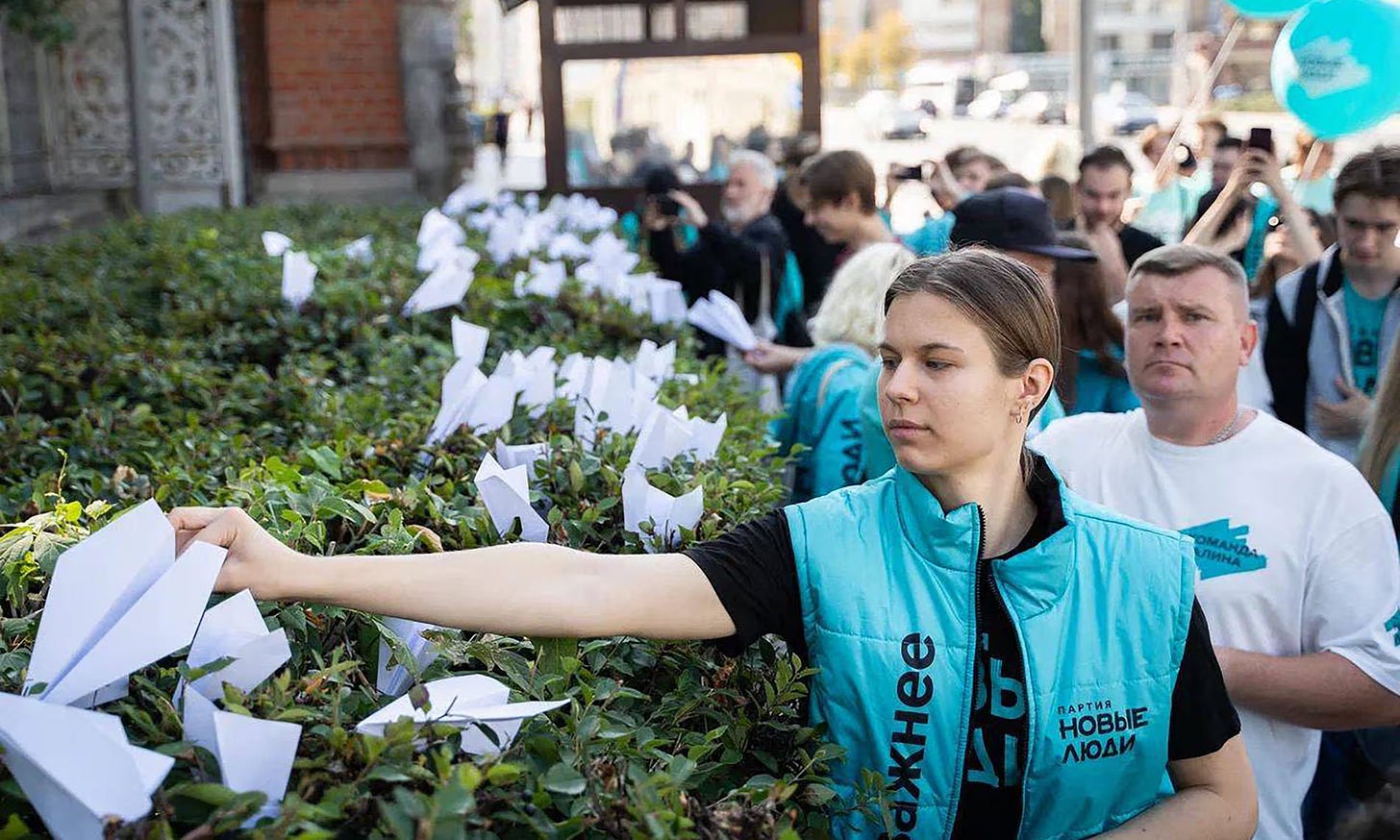
French President Emmanuel Macron insisted the arrest was "in no way a political decision," but many remained unconvinced. The timing – amid growing global debates about encryption – seemed suspicious to privacy advocates.
Throughout the ordeal, Durov maintained a characteristic stoicism, making few public statements. Telegram, meanwhile, insisted it "abides by European Union laws, including the Digital Services Act" and had appropriate moderation practices in place.
On March 15, 2025, after nearly seven months of legal limbo, Durov was granted temporary permission to leave France. He quickly departed for Dubai, though the underlying investigation continues, with his travel permission reportedly extending only until April 7.
"I want to thank the investigative judges for letting this happen, as well as my lawyers and team for their relentless efforts in demonstrating that, when it comes to moderation, cooperation, and fighting crime, for years, Telegram not only met but exceeded its legal obligations,” Durov wrote after returning to Dubai.
Telegram's Encryption Approach
At the heart of Durov's story lies the fundamental tension between security and privacy in the digital age.
Telegram's approach to encryption has always been a subject of debate among security experts. Unlike some competitors, Telegram doesn't enable end-to-end encryption by default for all conversations. Standard chats are encrypted in transit but stored on Telegram's servers, while only "Secret Chats" offer full end-to-end encryption where no one – not even Telegram – can access the content.
This hybrid approach has drawn criticism from both sides. Privacy purists argue it doesn't go far enough in protecting all communications by default. Law enforcement and some security experts counter that even Telegram's limited encryption creates dangerous "dark spaces" where criminal activity can flourish.
The proprietary nature of Telegram's MTProto protocol has also sparked debate. Unlike the open-source Signal Protocol used by WhatsApp and Signal, MTProto was developed in-house by Nikolai Durov and hasn't undergone the same level of public scrutiny.
Despite these criticisms, Telegram's approach has proven remarkably successful at balancing user experience with privacy protection. Its partial encryption model allows features like cloud sync across devices without compromising security for sensitive conversations.
The Man Behind the Platform
Despite his high profile, Durov remains mysterious – a contradiction of public visibility and personal privacy.
Always dressed in black, Durov leads an ascetic lifestyle by billionaire standards. He claims to abstain from meat, alcohol, and even coffee, while avoiding ownership of cars, houses, or other physical assets that might restrict his freedom.
"I have a few hundred million dollars in my bank account or in Bitcoin since 10 years ago. I don't own cars, houses, or property anywhere in the world, and that's a deliberate choice... I don't want to be tied down," Durov told Tucker Carlson.
This minimalism extends to his business approach. Telegram's success has been entirely organic, with Durov proudly noting that the company spends nothing on marketing. His refusal to give up ownership or voting control of Telegram, even when raising funds, reflects this commitment to independence.
In July 2024, shortly before his arrest, Durov made headlines with a striking claim: that he had fathered more than 100 children through sperm donations in a dozen countries, describing this as his "civic duty." The revelation added another layer of mystique to his already enigmatic public persona.
"People love our product," Durov told Tucker Carlson in an interview shortly before his arrest. "People like to use good things. And they don't like to use inferior things."
Despite (or perhaps because of) these eccentricities, Durov has built a loyal following among tech enthusiasts, privacy advocates, and crypto communities. His unwavering stance on free speech and digital rights has made him a hero to many, even as it has put him at odds with governments worldwide.
Token Dispatch View 🔍
Pavel Durov's story isn't just about one man or one app – it's about the future of digital privacy in an increasingly surveilled world.
The ongoing tension between privacy-focused platforms and government oversight represents one of the central conflicts of our digital age. As encryption becomes more widespread, authorities warn of "going dark" – losing visibility into potentially dangerous communications. Yet privacy advocates counter that weakening encryption for anyone weakens it for everyone, creating vulnerabilities that can be exploited by hackers, authoritarian regimes, and other malicious actors.
Durov sits at the epicenter of this clash, having crafted a platform that walks the tightrope between competing demands. Telegram's hybrid encryption model – offering both cloud-based convenience and the option for private communication – represents a pragmatic middle ground that has attracted nearly a billion users.
The French authorities' case against Durov raises profound questions about platform liability. Should founders be legally responsible for how their tools are used? If Durov is ultimately convicted for criminal activities conducted on Telegram, it could create a chilling precedent for developers of privacy-enhancing technologies everywhere.
This case parallels others in the crypto world, notably that of Alexey Pertsev, the developer of Tornado Cash who was arrested in the Netherlands in 2022 on money laundering charges related to his code. Both cases ultimately ask the same question: Where does the responsibility of the creator end and the responsibility of the user begin?
What's clear is that Durov's vision – creating spaces for free communication outside government control – has struck a powerful chord in our surveillance-saturated world. Whether you view him as a principled freedom fighter or as someone naive about the real-world consequences of unmoderated platforms likely depends on your own values and priorities.
As we look to the future, the outcome of Durov's legal battle will have implications far beyond Telegram. It will help shape how we balance the competing goods of privacy and security, and whether the internet remains a space for truly private communication or becomes another extension of state surveillance.
One thing seems certain: regardless of what happens in the French courts, Pavel Durov has already secured his place in history as one of the most consequential digital pioneers of our time – a man who dared to build technology that even governments couldn't control, and who continues to fight for that vision despite the personal cost.
Token Dispatch is a daily crypto newsletter handpicked and crafted with love by human bots. You can find all about us here 🙌
If you want to reach out to 200,000+ subscriber community of the Token Dispatch, you can explore the partnership opportunities with us.
Disclaimer: This newsletter contains sponsored content and affiliate links. All sponsored content is clearly marked. Opinions expressed by sponsors or in sponsored content are their own and do not necessarily reflect the views of this newsletter or its authors. We may receive compensation from featured products/services. Content is for informational purposes only, not financial advice. Trading crypto involves substantial risk - your capital is at risk. Do your own research.


